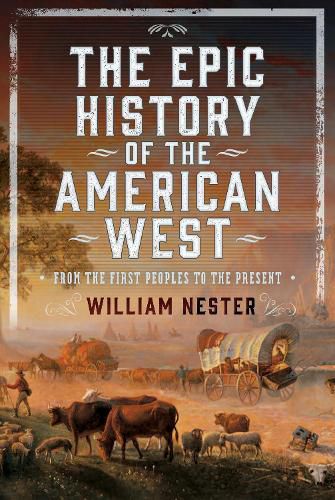Readings Newsletter
Become a Readings Member to make your shopping experience even easier.
Sign in or sign up for free!
You’re not far away from qualifying for FREE standard shipping within Australia
You’ve qualified for FREE standard shipping within Australia
The cart is loading…






The American West evokes powerful imagery-warriors on horseback, cowboys in saloons, and pioneers in wagons heading westward. It symbolizes freedom, reinvention, and the American Dream. However, this idealized image obscures the complex, often violent history of the West, which is as unjust as it is inspiring. Historians debate the boundaries of the American West, but it's clear that it's a dynamic concept-both a place and an idea, evolving over time. For three centuries, the frontier and western history overlapped until the frontier disappeared in 1890. Early narratives celebrated explorers, settlers, and entrepreneurs who developed the West, portraying them as heroic figures. However, modern historians criticize this "triumphant" view, highlighting the exploitation, racism, and ecological damage caused by Western expansion. They focus on marginalized groups-racial minorities, women, and workers-while critiquing the often-overlooked injustices faced by Indigenous peoples and others. This revisionist perspective emphasizes the darker aspects of Western history, challenging previous glorifications of development and heroism. The Epic History of the American West bridges traditional and revisionist views, exploring the region's complex legacy, from violent struggles to ongoing cultural and ideological conflicts. It reflects the West's enduring significance, blending history and mythology to reveal its multifaceted nature. AUTHOR: Dr William Nester, a Professor at the Department of Government and Politics, St. John's University, New York, is the author of more than forty books on history and politics. His book George Rogers Clark: I Glory in War won the Army Historical Foundation's best biography award for 2013, and Titan: The Art of British Power in the Age of Revolution and Napoleon, won the New York Military Affairs Symposium's 2016 Arthur Goodzett Book Award. 16 b/w illustrations
$9.00 standard shipping within Australia
FREE standard shipping within Australia for orders over $100.00
Express & International shipping calculated at checkout
The American West evokes powerful imagery-warriors on horseback, cowboys in saloons, and pioneers in wagons heading westward. It symbolizes freedom, reinvention, and the American Dream. However, this idealized image obscures the complex, often violent history of the West, which is as unjust as it is inspiring. Historians debate the boundaries of the American West, but it's clear that it's a dynamic concept-both a place and an idea, evolving over time. For three centuries, the frontier and western history overlapped until the frontier disappeared in 1890. Early narratives celebrated explorers, settlers, and entrepreneurs who developed the West, portraying them as heroic figures. However, modern historians criticize this "triumphant" view, highlighting the exploitation, racism, and ecological damage caused by Western expansion. They focus on marginalized groups-racial minorities, women, and workers-while critiquing the often-overlooked injustices faced by Indigenous peoples and others. This revisionist perspective emphasizes the darker aspects of Western history, challenging previous glorifications of development and heroism. The Epic History of the American West bridges traditional and revisionist views, exploring the region's complex legacy, from violent struggles to ongoing cultural and ideological conflicts. It reflects the West's enduring significance, blending history and mythology to reveal its multifaceted nature. AUTHOR: Dr William Nester, a Professor at the Department of Government and Politics, St. John's University, New York, is the author of more than forty books on history and politics. His book George Rogers Clark: I Glory in War won the Army Historical Foundation's best biography award for 2013, and Titan: The Art of British Power in the Age of Revolution and Napoleon, won the New York Military Affairs Symposium's 2016 Arthur Goodzett Book Award. 16 b/w illustrations